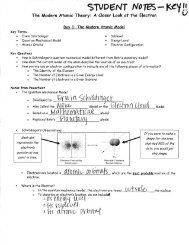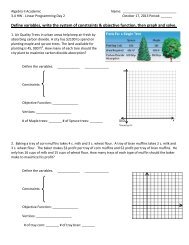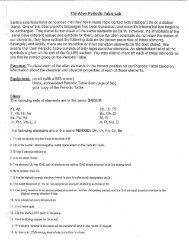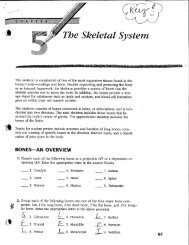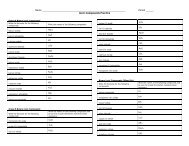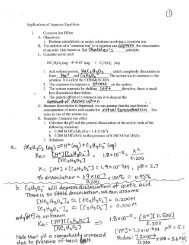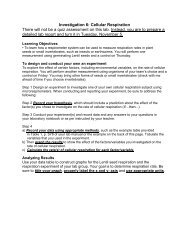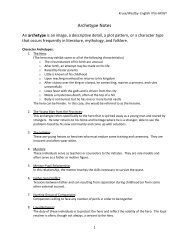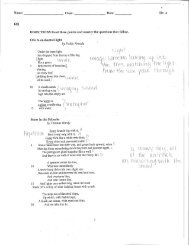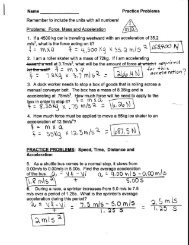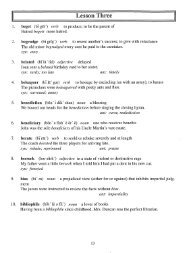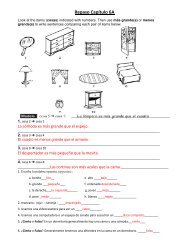How Long Can You Hold Your Breath?
How Long Can You Hold Your Breath?
How Long Can You Hold Your Breath?
You also want an ePaper? Increase the reach of your titles
YUMPU automatically turns print PDFs into web optimized ePapers that Google loves.
Why do your muscles and other parts of your body need oxygen?<br />
All parts of your body need energy to do work. For example, muscles need energy to contract. <strong>You</strong>r<br />
body gets the energy it needs by combining food molecules (glucose) with oxygen in a process<br />
called cellular respiration.<br />
C6H12O6 + 6O2 > 6CO2 + 6H2O + energy for your body<br />
When your body breaks down glucose, carbon dioxide is produced. Too much carbon dioxide can<br />
result in damage to muscles or other body parts, so there must be a way to get oxygen into the body<br />
and carbon dioxide out.<br />
<strong>Hold</strong>ing your breath<br />
Normally you breathe automatically, without even thinking about it. <strong>How</strong>ever, you can control your<br />
breathing voluntarily when you want to. For example, you can stop breathing and hold your breath<br />
for awhile.<br />
Because it is so important to maintain a continuous supply of oxygen, in a healthy person the part of<br />
your brain which controls breathing will not let you hold your breath forever. When you try to hold<br />
your breath for a long time, after a while this part of your brain will automatically start the breathing<br />
rhythm again, even if you try very hard to hold your breath.<br />
Procedure<br />
Name<br />
Due Date<br />
<strong>How</strong> <strong>Long</strong> <strong>Can</strong> <strong>You</strong><br />
<strong>Hold</strong> <strong>You</strong>r <strong>Breath</strong>?<br />
1. <strong>How</strong> long do you think you can hold your breath in minutes and seconds?<br />
2. <strong>How</strong> do you think your brain detects when you should not hold your breath any longer and you<br />
must start breathing again? What signals might stimulate your brain to make you start breathing<br />
again, even though you are trying to hold your breath?
3. Now you will carry out a simple experiment to test whether changes in the levels of oxygen and<br />
carbon dioxide in your blood provide the signal to stop holding your breath. <strong>You</strong> will breathe into<br />
a plastic bag for 1 minute and then hold your breath for as long as you can.<br />
Before you actually carry out this experiment, predict what you think will happen by answering the<br />
following questions.<br />
While you are breathing into the plastic bag, what happens to the levels of carbon dioxide and<br />
oxygen in the bag?<br />
What affect does this have on the levels in your lungs, blood and brain?<br />
What changes do you predict in how long you can hold your breath after breathing into the bag.<br />
Explain.<br />
4. In order to do a controlled experiment, you first need to see how long you can hold your<br />
breath. Everyone in the group should hold their breath for as long as possible and compare the<br />
time to the times of others in your group. After breathing normally for a minute, try to beat your<br />
group members times. Record how long you held your breathe in the data table provided.<br />
5. <strong>Breath</strong> normally for a few minutes. Then open a plastic bag and swish it around to fill it with air.<br />
<strong>Hold</strong> the bag over your mouth and nose and breathe into the bag as normally as you can for 1<br />
minute or as to a minute as you can. If you feel light-headed – STOP!<br />
At the end of your bag-breathing time, take a deep breath of air from the bag and hold your<br />
breath as long as you can while someone times you. <strong>How</strong> long did you hold your breath?<br />
Record you time on the data table.<br />
Procedure – <strong>How</strong> you breathe<br />
6. Finally, test whether you breathe differently after holding your breath for as long as you can.<br />
First observe how you breathe during normal breathing. Next, hold your breathe as long as you<br />
can. Then, observe how you breathe after holding your breathe. Describe the differences in<br />
breathing after holding your breath, compared to your normal breathing. Does it have an affect<br />
on your heart rate?
Data Table<br />
Analysis<br />
Group Members Name<br />
<strong>How</strong> long breath held after normal<br />
breathing<br />
Make a graph of your results from the data table<br />
Explain your results?<br />
<strong>How</strong> long breath held after<br />
breathing in bag



